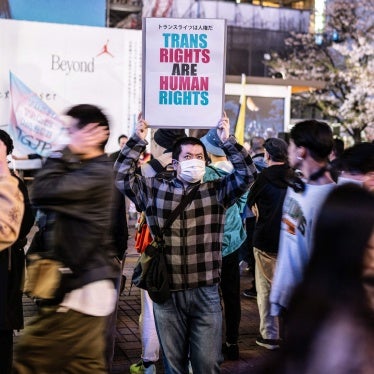(New York) - New arrests of metis (an indigenous term for transgender people) and HIV/AIDS outreach workers in Kathmandu show that a persistent pattern of police violence and abuse has not abated, Human Rights Watch said today.
Human Rights Watch has learned that on the night of March 14, the eve of the Holi festival (festival of colors) – a major Hindu religious holiday – police in the Thamel and Durbar Marg areas of Kathmandu rounded up 26 metis. According to the Blue Diamond Society, a Nepali non-governmental organization (NGO) working in the fields of sexual rights, sexual health and HIV prevention, they were taken to the Hanuman Dhoka central police station in Kathmandu. Five were later moved to Kalimati police station. Human Rights Watch understands that as of March 16, they have still not been permitted to speak to a lawyer. All have reportedly been charged with committing a “public nuisance.” No further particulars of their alleged offence are known.
“This is the latest incident in a violent police campaign to ‘cleanse’ Kathmandu of those considered undesirable,” said Scott Long, director of the Lesbian, Gay, Bisexual, and Transgender Rights Program at Human Rights Watch. “Police regularly assault and in some cases sexually abuse transgender people, all in the name of enforcing ‘moral values.’”
Those arrested included two staff, two outreach workers, and two peer educators working for the Blue Diamond Society. The Blue Diamond Society has repeatedly documented police abuse of transgender people, also known as hijras. In other recent incidents, on January 3, three metis walking in the Thamel district were reportedly severely beaten by four uniformed policemen who shouted, “Metis! Kill them!” The police threatened that “these hijras pollute the society and must be cleaned out.” On December 28, police arrested a meti, took her to the Shore Khutte police station, and forcibly stripped and mocked her while checking her genitals. They also allegedly threatened to cut her hair off as punishment for wearing women’s clothes. She was released the next day.
Previously in August 2004, police had also rounded up 39 metis from gathering places in Kathmandu. They were held for almost two weeks in the Hanuman Dhoka police station. Journalists were allegedly summoned to videotape the detainees in their cell, and when one meti complained, three policemen reportedly beat her. Another was beaten when she demanded to use a toilet. The detainees said that police told them: “Acid should be put on the faces of the hijras: they don’t deserve to live.” The detainees were finally released amid mounting international pressure. The metis received no redress for their detention or abuses sustained.
“Arbitrary arrest, police abuse, and discrimination against any group send a message that all Nepalis’ basic rights are at the government’s mercy,” said Long. “By jailing outreach workers campaigning against the spread of HIV/AIDS, the police threaten public health as well as civil liberties.”







